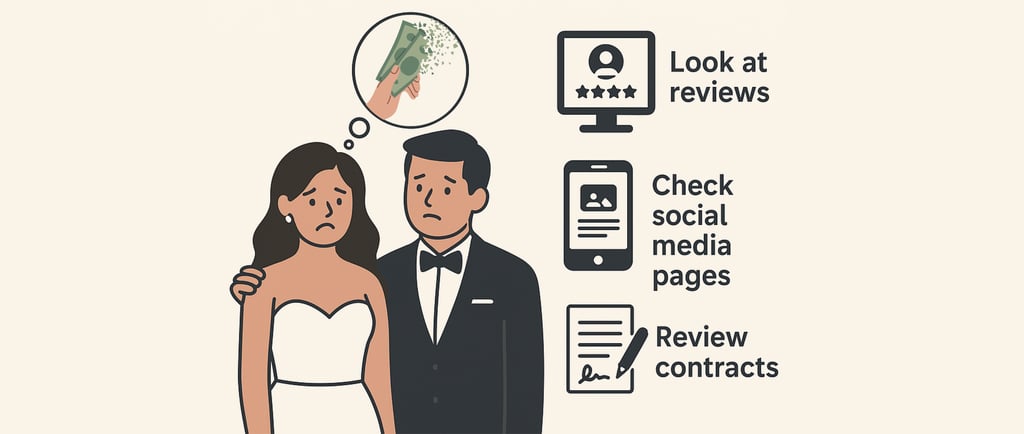Protect Your Big Day: How to Spot and Avoid Wedding Vendor Scams
This post breaks down how to protect yourself from common scams—like vendors taking a deposit and disappearing—by checking reviews, verifying contracts, and spotting red flags early.
6/4/20252 min read


Planning a wedding is one of the most exciting times in life—but it's also a time when you’re most vulnerable to scams. Unfortunately, stories of couples paying deposits only to have vendors vanish without a trace are far too common. As a professional in the wedding industry, I’ve seen how heartbreaking these situations can be, and I want to help you avoid them.
Here’s what you need to know to protect yourself and your wedding budget:
The Most Common Wedding Vendor Scam: The Disappearing Act
One of the most devastating scams couples face is when a vendor takes a deposit—sometimes thousands of dollars—and then simply doesn’t show up on the wedding day. The couple is left scrambling, disappointed, and often unable to recover the money.
While most vendors are hardworking professionals, bad actors do exist. Here's how to protect yourself.
1. Do Your Research: Check Reviews and Reputation
Before handing over any money, look up the vendor's:
Google Reviews and The Knot/WeddingWire: Real feedback from past clients can reveal a lot. One or two negative reviews aren't always a red flag, but a pattern of poor communication or no-shows definitely is.
Social Media Presence: Active and consistent social media pages often show recent work, behind-the-scenes footage, and engagement with followers—signs of a legitimate business.
Tagged Photos: Look at what clients have tagged the vendor in. This is often unfiltered, real-world proof of their work and presence at events.
2. Ask for a Contract—and Read It Thoroughly
Never work with a vendor who doesn’t offer a formal, written contract. A solid contract should include:
Names, dates, and contact information
Payment schedule and refund policies
Clear description of services provided
Contingency plans for emergencies
A professional vendor will walk you through the contract and answer any questions without hesitation. If anything feels vague or rushed, that's a red flag.
3. Look for Red Flags Early On
Be cautious of vendors who:
Only communicate through DMs or text, and avoid phone or video calls
Demand full payment up front, rather than a deposit with a balance due later
Refuse to provide references or a contract
Offer pricing that’s drastically lower than others in the market
While affordability is important, if something seems too good to be true, it usually is.
4. Pay Securely and Keep Records
Always use secure methods for payments—credit cards or invoicing platforms like HoneyBook, Square, or PayPal. Avoid cash apps or wire transfers unless you're 100% confident in the vendor. Keep a paper trail of all communications and receipts.
Final Thoughts: Trust, But Verify
Your wedding day should be filled with joy—not stress about whether a vendor will show up. By doing your homework, asking questions, and trusting your gut, you can confidently book vendors who will deliver what they promise.
